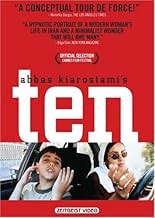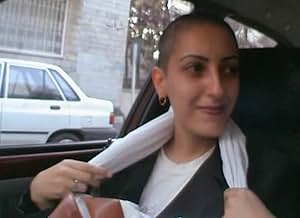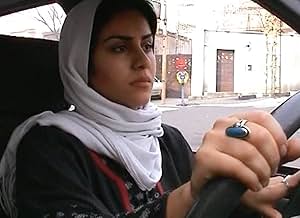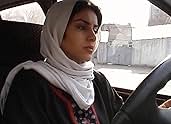NOTE IMDb
7,4/10
8,8 k
MA NOTE
Ajouter une intrigue dans votre langueA visual social examination in the form of ten conversations between a driving woman and her various pick-ups and hitchhikers.A visual social examination in the form of ten conversations between a driving woman and her various pick-ups and hitchhikers.A visual social examination in the form of ten conversations between a driving woman and her various pick-ups and hitchhikers.
- Récompenses
- 1 victoire et 4 nominations au total
Amina Maher
- Amin
- (as Amin Maher)
Roya Akbari
- Prostitute + Lover
- (as Roya Arabshahi)
Histoire
Le saviez-vous
- AnecdotesApart from Mania Akbari, actors are non-professional. The young boy is played by her own son and their relationship is partly based on real-life elements.
- GaffesCar windows, both driver's and passenger's, vary between being closed, part-open or open between shots.
- Citations
Prostitute: [to a Married woman] You are wholesailers. We are retailers.
- ConnexionsFeatured in 10 on Ten (2004)
- Bandes originalesWalking In The Air
Written and Performed by Howard Blake
© Chester Music Limited represented by Première Music Group
Commentaire à la une
I saw this in memory of Abbas Kiarostami who passed away the other day, this Sufi seer of transient, evanescent life that circles back and goes out again like fireflies in the night. I have felt him so close in spirit; it was one of the saddest losses in recent years.
My relationship with him is rather simple and uncluttered, much like the films he makes. Shucks about form and whether the camera moves or not as far as I'm concerned. It's a tool to create stillness so that simple gestures will ring wide; but you can't still the mind of a viewer who has a million thoughts running in his head while watching, and you can't prevent a viewer who wants to remain still by moving the camera.
And I urge you as always to not settle for receiving films, his or anyone else's, as only cultural items that were made for us to intellectualize and keep up to date with norms of life in faraway places. It can make for interesting post-viewing discussion, but most of all, make sure to know things privately in your own self, allow them to have their cosmic import that speaks about the fact that here you are, living a life that will last a little while more.
A woman drives around Tehran, having conversations with people on the passenger's seat during a day and a night, this is the whole story here. We never leave the car. The camera simply flits between shots of the driver and passenger.
By way of insights, you will glean several here, about the place of women in Iran, expectations of being a housewife and how hard it is to obtain a divorce. Religion as focal point. You might consider that her unruly son who constantly berates her is promulgating larger social attitudes at play; a far more eyeopening way than showing us an angry mullah. You will get to decide how much of all this echoes your own society.
But now, how about we allow it to simply be about a woman who drives around life that wells up around her with anxieties?
A life that breaks down around the edges, as all lives do. A marriage that didn't work out and a son that pushes himself away from her. A man and woman who wanted different things from life and parted ways. You might appreciate here that the man allowed himself to be painted as drug user before the court as the only way for her to get the divorce.
Parallel, possible lives materialize in the seat next to her. A sister who is going through a breakup she has already gone through; how hopeless it is to cling to love that isn't there. Another woman whose marriage was broken off at the last moment. A prostitute who scoffs at the conventions of marriage. An old woman on her way to the mosque.
It ends with a son who is growing up to be a man and she has to softly let go into life. It isn't just a social film, but you'll have to allow yourself to watch from a softer distance. Kiarostami does it here, bestows the gift of wisdom. In the right ears, it will be a sutra teaching us impermanence and non-attachment.
My relationship with him is rather simple and uncluttered, much like the films he makes. Shucks about form and whether the camera moves or not as far as I'm concerned. It's a tool to create stillness so that simple gestures will ring wide; but you can't still the mind of a viewer who has a million thoughts running in his head while watching, and you can't prevent a viewer who wants to remain still by moving the camera.
And I urge you as always to not settle for receiving films, his or anyone else's, as only cultural items that were made for us to intellectualize and keep up to date with norms of life in faraway places. It can make for interesting post-viewing discussion, but most of all, make sure to know things privately in your own self, allow them to have their cosmic import that speaks about the fact that here you are, living a life that will last a little while more.
A woman drives around Tehran, having conversations with people on the passenger's seat during a day and a night, this is the whole story here. We never leave the car. The camera simply flits between shots of the driver and passenger.
By way of insights, you will glean several here, about the place of women in Iran, expectations of being a housewife and how hard it is to obtain a divorce. Religion as focal point. You might consider that her unruly son who constantly berates her is promulgating larger social attitudes at play; a far more eyeopening way than showing us an angry mullah. You will get to decide how much of all this echoes your own society.
But now, how about we allow it to simply be about a woman who drives around life that wells up around her with anxieties?
A life that breaks down around the edges, as all lives do. A marriage that didn't work out and a son that pushes himself away from her. A man and woman who wanted different things from life and parted ways. You might appreciate here that the man allowed himself to be painted as drug user before the court as the only way for her to get the divorce.
Parallel, possible lives materialize in the seat next to her. A sister who is going through a breakup she has already gone through; how hopeless it is to cling to love that isn't there. Another woman whose marriage was broken off at the last moment. A prostitute who scoffs at the conventions of marriage. An old woman on her way to the mosque.
It ends with a son who is growing up to be a man and she has to softly let go into life. It isn't just a social film, but you'll have to allow yourself to watch from a softer distance. Kiarostami does it here, bestows the gift of wisdom. In the right ears, it will be a sutra teaching us impermanence and non-attachment.
- chaos-rampant
- 11 juil. 2016
- Permalien
Meilleurs choix
Connectez-vous pour évaluer et suivre la liste de favoris afin de recevoir des recommandations personnalisées
- How long is Ten?Alimenté par Alexa
Détails
- Date de sortie
- Pays d’origine
- Site officiel
- Langue
- Aussi connu sous le nom de
- Untitled Abbas Kiarostami 2002
- Lieux de tournage
- Sociétés de production
- Voir plus de crédits d'entreprise sur IMDbPro
Box-office
- Montant brut aux États-Unis et au Canada
- 105 990 $US
- Week-end de sortie aux États-Unis et au Canada
- 10 559 $US
- 9 mars 2003
- Montant brut mondial
- 452 895 $US
Contribuer à cette page
Suggérer une modification ou ajouter du contenu manquant






















